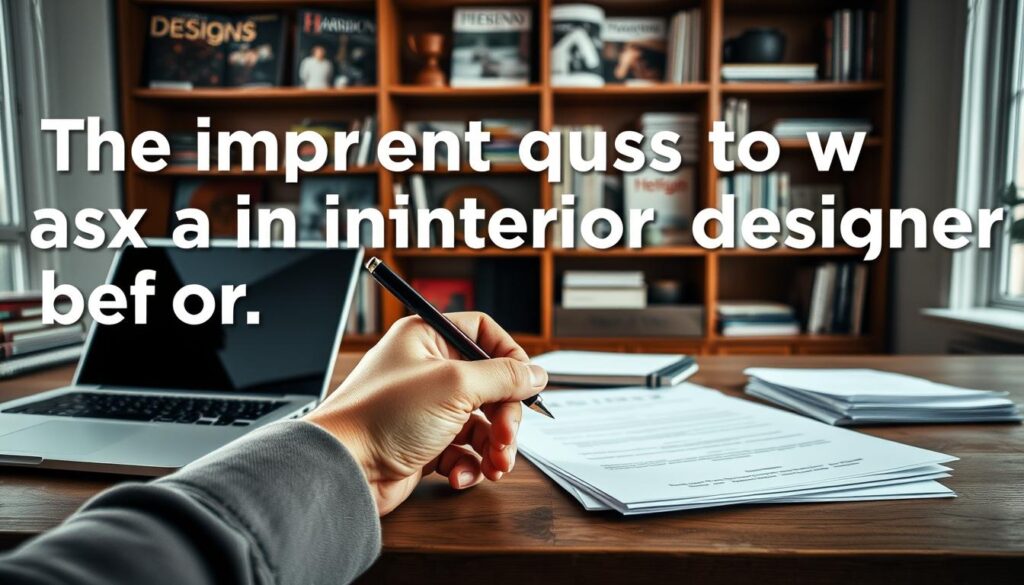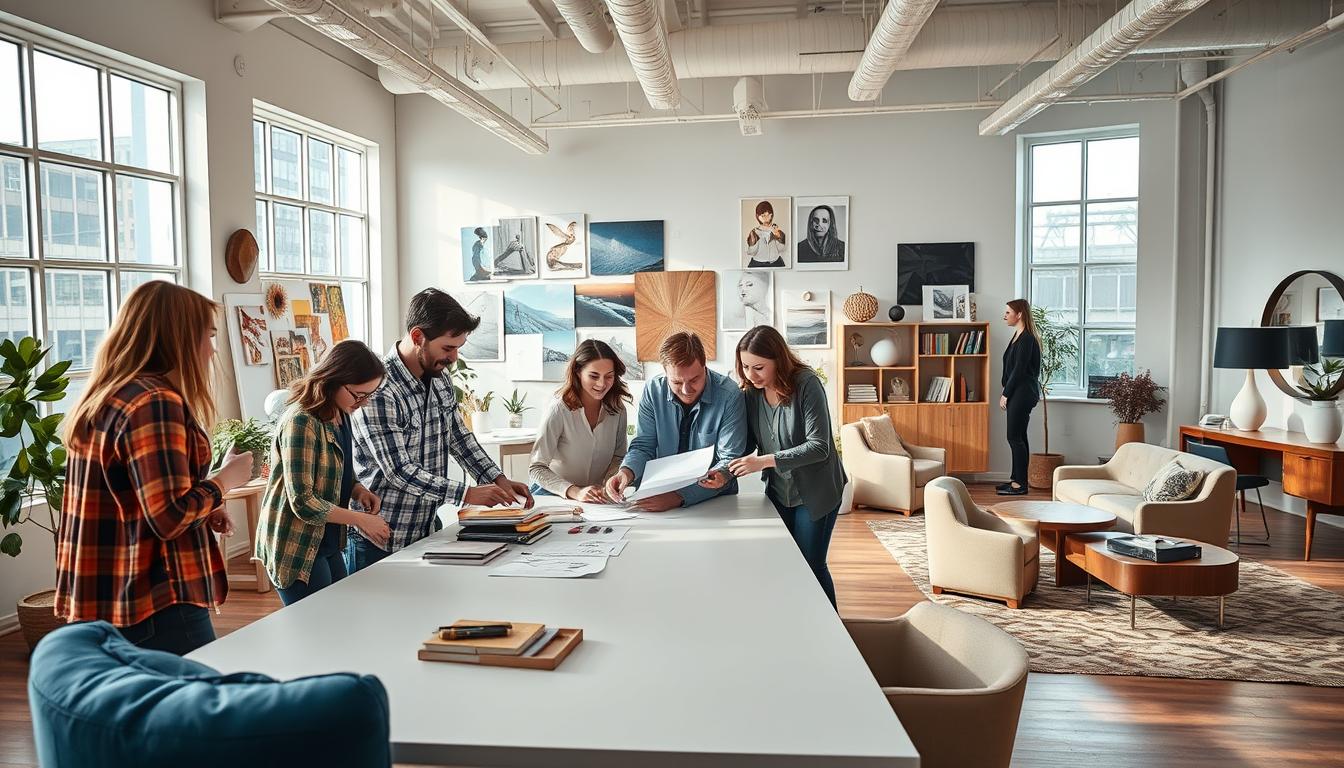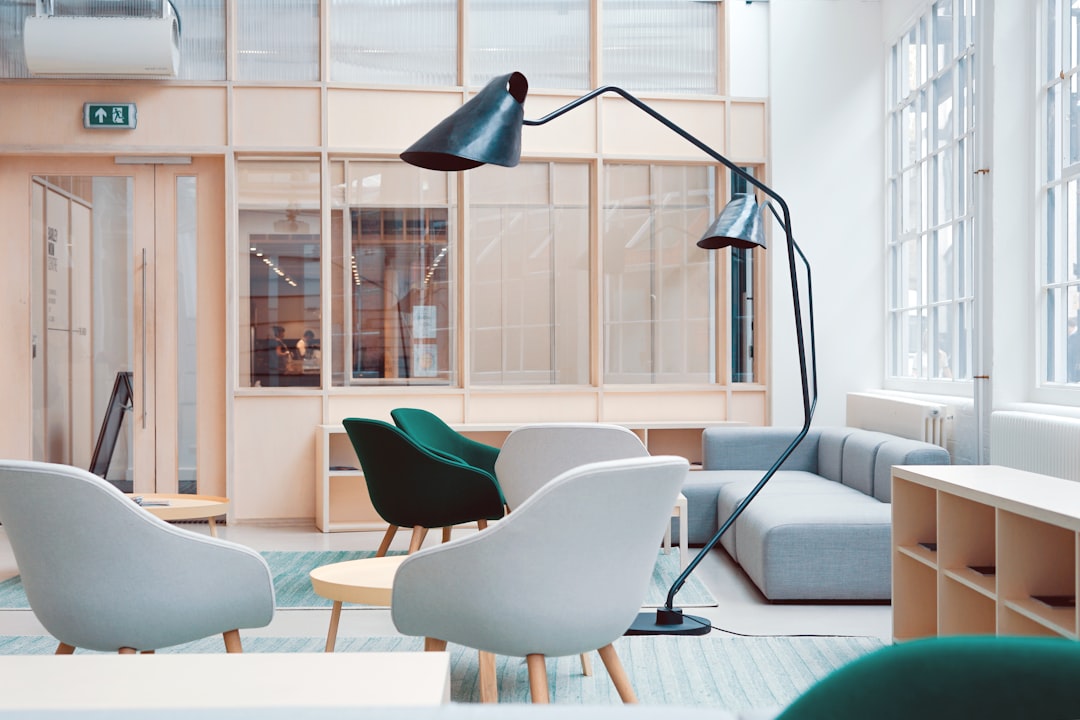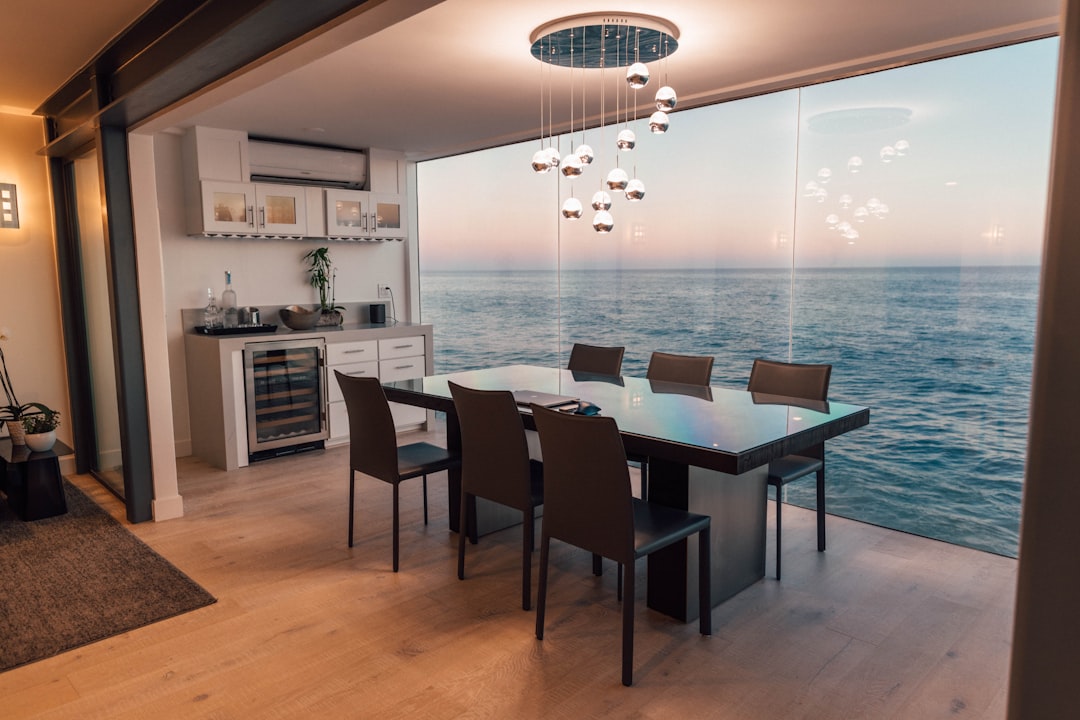Did you know a well-designed space can boost productivity by up to 20%? With more people seeking interior design experts, finding the right ones is key. This is true for both your home and work spaces.
Transforming your space to match your style and needs is vital. By choosing local interior design firms near me, you get a design that looks good and works well.
Key Takeaways
- Local interior design experts can make your space better looking and more functional.
- Professionals help create a design that shows off your style and meets your needs.
- A well-designed space can improve your productivity and happiness.
- Interior design experts bring new ideas and creativity to your project.
- Working with local experts means getting more tailored and effective design solutions.
Why Choose Local Interior Design Firms?
Local interior designers offer many benefits. They know the local style and can give you personalized service. This means your space will look great and fit right in.
Benefits of Hiring Local Experts
Local designers know a lot about your area’s architecture, climate, and culture. They make sure your design looks good and works well for you.
Key benefits include:
- Understanding of local building codes and regulations
- Familiarity with local suppliers and contractors
- Ability to provide site-specific design solutions
Familiarity with Regional Trends
Local designers keep up with the latest trends in your area. They use local elements to make your space unique.
Regional trends can include:
| Trend | Description | Local Element |
|---|---|---|
| Coastal Design | Light, airy spaces with natural textures | Use of driftwood and sea-inspired colors |
| Urban Modern | Sleek, modern spaces with industrial elements | Incorporation of exposed brick and metal accents |
| Rural Chic | Warm, inviting spaces with natural materials | Use of reclaimed wood and earthy tones |
Personalized Service and Support
Local designers offer personalized service. They support you from the start to the end of your project. They make sure your vision comes to life.
Choosing local interior design services means you get a beautiful space. You also get the confidence of knowing your project is in good hands.
What to Look for in an Interior Design Firm
Choosing the right interior design firm is key to a successful project. Look for reputable interior design studios with experience, a great portfolio, and positive client feedback. Also, check the services they offer.
Experience and Portfolio
An interior design firm’s experience is crucial. They should have a track record in projects like yours. A detailed portfolio shows their skills and style.
For best interior decorators nearby, their portfolio should show variety and expertise. This ensures they can handle different projects well.
Client Testimonials and Reviews
Client feedback is very important. It shows how professional and reliable a firm is. Check online reviews on Yelp or Google Reviews for a full picture.
Good feedback means the firm is skilled and trustworthy. This is a key factor in choosing a firm.
Range of Services Offered
A full-service interior design firm can do it all. This includes commercial interior design firms for big projects. Working with a firm that offers everything can make the process smoother.
| Service | Description | Benefit |
|---|---|---|
| Space Planning | Optimizing the use of space | Efficient use of area |
| Color Consultation | Selecting appropriate color schemes | Enhances aesthetic appeal |
| Furniture Selection | Choosing furniture that fits the design | Ensures cohesion and functionality |
By looking at these factors, you can find the right interior design firm. This ensures your project is a success.
Top Interior Design Styles to Explore
There are many interior design styles to choose from, like modern and minimalist. Picking the right one can really improve your living space. Let’s look at the top styles and what makes each one special.
Contemporary Design
Contemporary design is always changing. It’s known for its clean lines, simple colors, and focus on being useful. Modern interior design companies use new trends and tech to make spaces that are both stylish and practical. “Contemporary design is all about embracing the present and looking towards the future,” says a famous interior designer.
Rustic Charm
Rustic design adds warmth and coziness to any room. It often uses natural materials like wood and stone. This style is great for those who love traditional or vintage looks. Luxury home interior designers use rustic elements to add character and depth to a room.
Industrial Aesthetics
Industrial design is popular for its raw, edgy feel. It often includes exposed brick, metal beams, and reclaimed wood. This style is perfect for those who love the beauty of unfinished spaces.
“Industrial design is not just about aesthetics; it’s about creating a space that tells a story.”
Minimalism for Small Spaces
Minimalist design is great for small spaces. It focuses on simplicity and being useful. By using few colors and less clutter, interior design styles like minimalism can make small spaces feel bigger and more peaceful.
Each interior design style has its own way to change your space. Whether you like the sleek look of contemporary design or the cozy feel of rustic charm, knowing what each style offers can help you choose the best one for your project.
How to Collaborate with Designers
Working well with designers is crucial for your dream interior. By teaming up with local interior design firms, your project will be done on time and within budget. Plus, it will meet your expectations.
Communication is Key
Good communication is the base of a successful design project. Share your needs, preferences, and expectations clearly with your designer. This helps them get your vision right. Regular updates and feedback are key to a smooth collaboration.
To improve communication, try these tips:
- Set up regular meetings to talk about the project.
- Give clear and to-the-point feedback.
- Use mood boards or Pinterest to show your style.
Defining Your Vision
It’s important to clearly define your design vision. Think about what you want your space to be like. Think about your lifestyle, personal taste, and the room’s purpose.
| Design Element | Description | Example |
|---|---|---|
| Color Scheme | Choose colors that show your personality and style. | Warm neutrals for a cozy living room. |
| Furniture | Pick pieces that are both useful and look good. | A sleek sofa for a modern living room. |
| Lighting | Lighting sets the mood and highlights design. | Layered lighting for a sophisticated look. |
Budget Considerations
When working with designers, your budget is key. Set a realistic budget and share it with your designer. This helps make smart choices during the project.
Remember these budget tips:
- Material and finish costs.
- Furniture and fixture prices.
- Installation and construction labor costs.
Understanding communication, vision, and budget is crucial. This way, you can work well with interior designers. Together, you can create a space that shows your style and meets your needs.
The Role of Technology in Interior Design
Technology has changed how interior designers work. It makes their services more accessible and efficient. Designers can now create more accurate and detailed designs. This makes it easier to see and start your project.
Virtual Consultations and Services
One big advantage of technology is virtual consultations. This lets clients talk about their design needs from anywhere. It saves time and makes the design process more flexible. Virtual consultations also help designers work with more clients, no matter where they are.
Some key features of virtual consultations are:
- Remote meetings via video conferencing tools
- Sharing design concepts and ideas through digital platforms
- Real-time feedback and revisions
3D Modeling and Visualization
3D modeling and visualization are crucial in modern interior design. These tools help designers create detailed, interactive models. This gives clients a better idea of what the final design will look like.
The benefits of 3D modeling are:
- Enhanced client understanding through interactive models
- Ability to make real-time changes and adjustments
- Improved accuracy in design representation
Smart Home Integrations
Smart home technology has also impacted interior design. Smart home devices control lighting, temperature, security, and entertainment. This makes living more convenient and efficient.
Examples of smart home integrations include:
- Voice-controlled lighting systems
- Automated temperature control for optimal comfort
- Smart security systems for enhanced safety
By using these technologies, interior designers can offer better, more personalized designs. This improves the design experience for their clients.
Sustainability in Interior Design
Sustainability is now a key part of interior design. It affects how we pick materials and design spaces. It’s about being kind to our planet.
Using eco-friendly materials is a big part of sustainable design. These materials are made in ways that don’t harm the environment. Examples include reclaimed wood and bamboo.
Eco-Friendly Materials
These materials are good for the planet and for us. They help keep the air inside our homes clean. As interior design changes, using these materials is more important.
Energy-Efficient Design Practices
Designing spaces to use less energy is also key. This means using natural light and energy-saving lights. It helps save money and is better for the planet.
William McDonough, a famous architect, said, “Design is a signal of intention.” In sustainable design, that intention is to make spaces that are good for the planet. This idea is at the heart of energy-efficient design.
“The ultimate test of a moral society is the kind of world that it leaves for its children.” This quote by
talks about leaving a better world for our kids. It also fits with sustainable design, showing the importance of our choices.
Supporting Local Artisans
Helping local artisans is also important in sustainable design. Buying local reduces carbon emissions from transport. It also supports local economies and keeps traditional skills alive.
In summary, sustainable interior design is about using eco-friendly materials, saving energy, and supporting local artisans. By doing this, we make spaces that are not just beautiful but also good for the planet.
Preparing for Your Interior Design Project
Before starting your interior design project, it’s key to prepare well. Good preparation helps keep your project on track and meets your goals.
Setting a Realistic Budget
First, you need to set a realistic budget. This means figuring out how much you can spend on materials, labor, and design fees. To make a good budget, think about:
- The scope of your project
- The cost of materials and finishes
- Labor costs
- Any extra costs, like permits or inspections
By looking at these factors, you can make a budget that fits your money and project goals.
Creating a Timeline
Next, make a project timeline. This is a schedule for your project, with milestones and deadlines. To make a good timeline, consider:
- What your project is and how complex it is
- Any possible delays or challenges
- A realistic end date
- Update the timeline as needed
A good timeline keeps your project on schedule. It also makes sure everyone knows their tasks and deadlines.
Decluttering Your Space
Decluttering your space is a crucial step. It lets designers focus on making your space beautiful and functional.
To declutter well, follow these steps:
| Step | Description |
|---|---|
| 1 | Sort items into categories (e.g., keep, donate, discard) |
| 2 | Remove any unnecessary or unwanted items |
| 3 | Organize remaining items in a logical and accessible manner |
By decluttering and preparing your space, you’ll have a successful and stress-free interior design project.
Questions to Ask Before Hiring
Before hiring an interior designer, it’s important to ask the right questions. This ensures a successful collaboration. Knowing their approach, experience, and style helps you make a good choice.
What is Your Design Process?
It’s key to understand an interior designer’s process. This ensures it fits your project’s goals. Ask about their initial consultation, concept development, and revision handling.
Some designers use 3D modeling or virtual reality for visualization. Asking about these tools shows their innovation and adaptability.

How Do You Manage Budgets?
Budget management is crucial in interior design. Ask how they handle budget constraints and cost overruns. A good designer will provide cost breakdowns and suggest alternatives.
Good budget management means staying within budget and meeting expectations. Here are important questions to ask:
- How do you handle budget changes?
- Can you provide a detailed cost estimate?
- How do you source materials to stay within budget?
Can You Provide Previous Client References?
Requesting references from previous clients is a great way to evaluate a designer. It shows their reliability, work quality, and professionalism. Past clients can share insights into the designer’s strengths and weaknesses.
Don’t hesitate to ask for references and contact the provided contacts. This step is crucial in your decision-making. As interior design expert Laura Thompson said, “A good designer will always be happy to provide references; it’s a sign of their confidence in their work.”
Cost Considerations for Interior Design
Understanding the costs of interior design is key to making smart choices. The price can change a lot. This depends on your space size, design complexity, and the designer’s experience.
Average Pricing for Design Services
Interior designers charge between $50 to $200 per hour. This price varies with their skill and the services needed. For a full design project, costs can be from $2,000 to $10,000 or more.
Here are some general estimates for different types of interior design services:
- Initial Consultation: $100-$500
- Space Planning: $500-$2,000
- Full-Service Design: $2,000-$10,000+
Hidden Costs to Beware Of
It’s important to know about hidden costs too. These can include:
- Additional Fees for Revisions: Some designers charge extra for big changes.
- Rush Fees: Faster services might cost more.
- Procurement Fees: Designers might add a markup on items they source.
Cost-Saving Tips and Strategies
To save money on design without losing quality, try these tips:
- Set a Clear Budget: Tell your designer your budget from the start.
- Prioritize: Focus on the most important parts of your project.
- Shop Smart: Look for deals or second-hand items for furniture and decor.
- DIY Where Possible: Do simple tasks like painting or assembling furniture to save on labor.
Knowing the costs of interior design and watching out for hidden costs helps you plan better. This way, you can reach your design goals without breaking the bank.
Trends in Interior Design to Watch
The interior design world is moving towards sustainable and functional spaces. This change comes from our growing need for spaces that are good for us and the planet. These spaces should look great and improve our health.
Biophilic Design Elements
Biophilic design is a big trend now. It brings the outdoors inside by using natural materials, plants, and lots of light. This not only makes spaces look better but also boosts our mood and work performance.
- Incorporating natural textures like wood and stone
- Using plants as decorative elements and air purifiers
- Maximizing natural light through strategic window placement
The Rise of Multifunctional Spaces
Remote work and the need for flexible living spaces are driving the trend of multifunctional areas. These areas do more than one thing, making them efficient and practical for today’s lifestyle.
Examples include:
- Living rooms that double as home offices
- Kitchen islands that serve as dining areas
- Bedrooms with built-in storage to reduce clutter
Emphasis on Comfort and Wellness
There’s a focus on creating spaces that are comfortable and promote wellness. This includes ergonomic furniture and thinking about the impact of colors, lights, and scents.
Key considerations include:
- Using ergonomic furniture to support health and comfort
- Selecting color palettes that promote relaxation or stimulation as needed
- Incorporating smart home technology to control lighting and temperature
By keeping up with these trends, you can make sure your space is stylish, useful, and good for your health and the planet.
Celebrating Diverse Design Aesthetics
Diverse design aesthetics add richness to interior design. They mix cultural influences and personal style. This mix makes a space look good and holds deeper meaning. It shows off one’s heritage and individuality.
Cultural Influences in Design
Cultural influences shape interior design. They bring unique perspectives, materials, and techniques. This enriches the design world.
Using traditional African patterns or Asian motifs in decor adds cultural depth. This honors cultural heritage and adds a unique touch to your home.
How to Integrate Personal Style
Adding your personal style to interior design is key. It’s about balancing your taste with the design you want.
- Identify what you like, like colors, furniture, or decor.
- Think about how to include these in your design in a way that feels true to you.
- Don’t be afraid to mix styles to make a look that’s uniquely yours.
Celebrating Diversity through Design Choices
Celebrating diversity in design means being open to different styles and influences. It’s about making a space that’s beautiful and tells a story.
By embracing diverse design, you create a home that reflects your style and celebrates the world’s cultural richness.
Finding Interior Design Firms Near You
Now that we’ve looked at interior design, it’s time to find the right professional. Discovering local interior design talent is exciting and rewarding.
Effective Search Strategies
Use online resources and directories to find interior designers. Websites like Houzz and Design Within Reach have lots of listings. They also show portfolios and client reviews.
Leveraging Social Media
Social media like Instagram and Pinterest are great for finding designers. They showcase their work, giving you a glimpse of their style and skills.
Attending Local Events
Going to local home shows and expos is also a good idea. These events let you meet designers, see their work, and talk about your project.
By trying these methods, you can find the perfect interior designer. They’ll make your space beautiful and functional, showing off your personal style.



